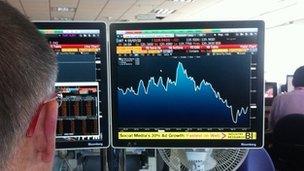Retail bonds open up new lane for retail investors
- Published

The company hopes to raise money from the general public, not just professional investors
Last week, every schoolboy's favourite trucker hit the market when we saw the launch of a bond issue by Eddie Stobart.
That is the company best known for its fleet of haulage trucks that fly along the motorways, each adorned with the name of a female celebrity.
What is interesting about this is that the Stobart bond is being sold direct to the general public in an attempt to raise about £25m.
Known as retail bonds, these glorified IOUs are becoming a popular way for companies to raise money, especially at a time when the banks are not playing ball.
Other companies which have gone down this route include National Grid, Severn Trent and Tesco Bank.
The question is whether these bonds are a good deal for investors and as with most things in life, there are pros and cons.
Inflation
Until recently, bond launches have been reserved for the big institutional investors, with retail investors not being involved.
Any individual wishing to invest has usually had to find a fund of corporate bonds all bundled together.
The retail bond for private investors could therefore be rather useful, and on the face of it some of these investments look attractive.
The Stobart bonds, for example, are paying a fixed interest rate of 5.5% over six years, at the end of which you get back all you invested at the start.
Compare that to the measly amounts you get on your current accounts and savings bonds, and you can see why hard-up savers are turning to retail bonds.
However there are a few 'buts'.
What if inflation starts rising again? If we continue with our Stobart example, that 5.5% rate is not going to look quite so good.
And remember it is fixed for six years, so you are taking a bet that inflation is not going to get back to where it was in September last year, when it was 5.2% on the retail prices index.
The same inflation risk applies to any investment of course, not just Stobart bonds, but you can see the problem here.
Sufficient return?
Another issue is that retail bonds are not risk free investments.
They are paying a higher rate than a bank account precisely because they do contain an element of risk - essentially the risk that the company could go out of business.
The question is: Are they paying you enough to take that risk?
What is more, although they do not hold the same risks as investing in shares, neither do retail bonds offer the same potential rewards.
Effectively you are loaning your money to the bond issuer, so there is no prospect of capital growth, unless you are able to buy the bonds on the market later at a discount to their launch price.
In that case you could make a gain if you hold on to the bond until it matures.
Three potential problems
Retail bonds also provide other differences from playing the stock market.

The value of bonds can be much more volatile than their traditional "boring" image suggests
First, there is less liquidity in bond markets when it comes to bonds from smaller companies, so it could be harder to buy and sell when you want, at the price you want.
Second, it is not always as simple as going online and buying a few hundred bonds of a certain company.
Often a company will have several - in some cases dozens - of different bonds with different time periods and interest rates.
So it needs some diligent research to find out which one is right for you.
And thirdly, the security of assets backing the bond could differ greatly; indeed some bonds are unsecured.
As with investing in individual stocks and shares, you need to evaluate the investment risks of each share or bond you choose and judge how it fits into your portfolio.
Buying a single bond or a handful of bonds is also riskier than buying a diversified bond fund.
The old maxim of not putting all your eggs in one basket is a well-worn phrase, but it is still an important one.
Using a broker
There are some operational issues that retail investors need to consider about this type of bond.
You can normally get a prospectus from the company itself or through which ever brokers have been chosen to operate the issue.
Depending on the stockbroker used, you may be able to purchase the bonds online, or on the phone, or by filling out a paper application
You will need to purchase the bond from one of the authorised distributors.
Each new retail bond issue from other firms may well have other distributors so investors will need to check.
I think that retail investors need to be very careful of the broker charges and costs if they do chose to buy.
It is not just the commission charges that matter. Often there are "inactivity charges" if you do nothing else with your stock broker's account, which can be over £40 each year.
So for small investors a good proportion of your income could go in costs.
The costs of investing
The minimum level of investment in the Stobart bond is £2,000 so at that level the costs can be expensive.
The amount you buy will depend upon the rest of your portfolio and how it is balanced with different asset classes - shares, bonds, property, commodities etc - but I would suggest a reasonable level would likely be £5,000.
Tesco raised £200m in two weeks to sell its 5% bond issue, so these bonds appear to be very popular as people look for other sources of income.
But be aware that companies are not banks. They are not covered by any guarantee that you would have with deposits in bank accounts.
Overall, I think the opening up of new bond issues to retail investors is a positive development.
Yes, there are risks, as there are with other investments.
But as with all things new, you need to do your homework or consult an expert on the subject.
The opinions expressed are those of the author and are not held by the BBC unless specifically stated. The material is for general information only and does not constitute investment, tax, legal or other form of advice. You should not rely on this information to make (or refrain from making) any decisions. Links to external sites are for information only and do not constitute endorsement. Always obtain independent, professional advice for your own particular situation.